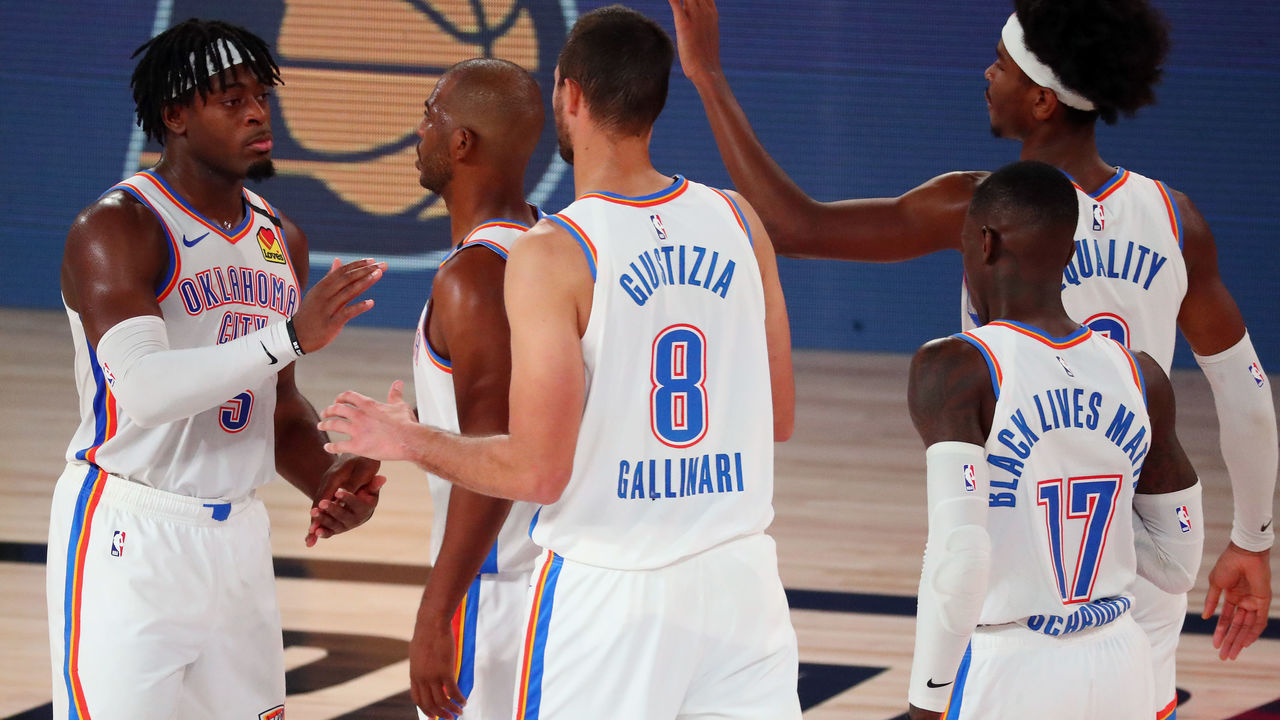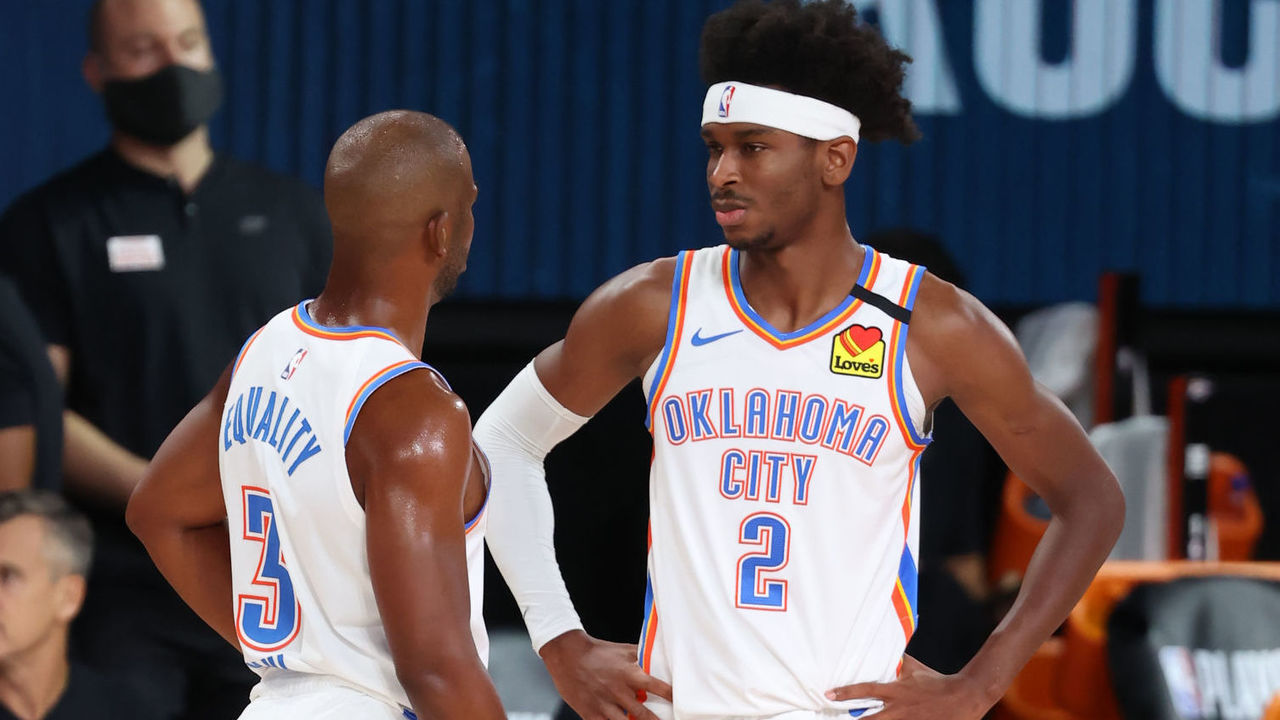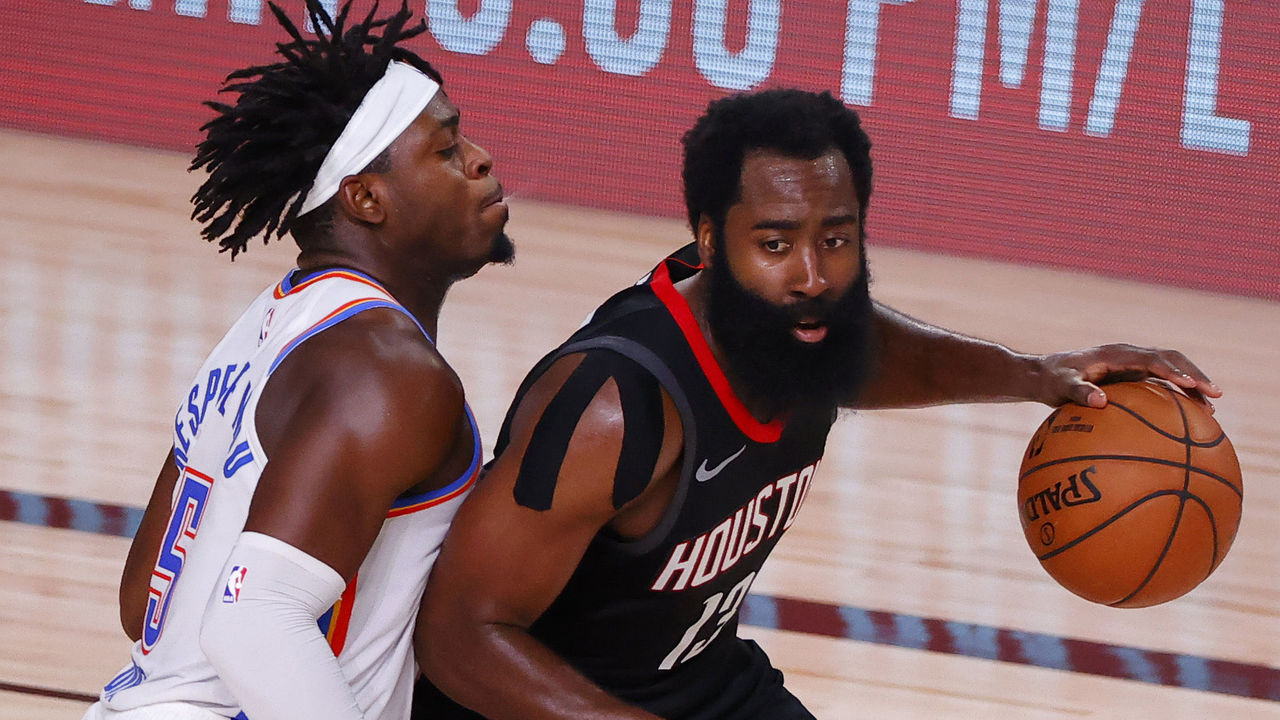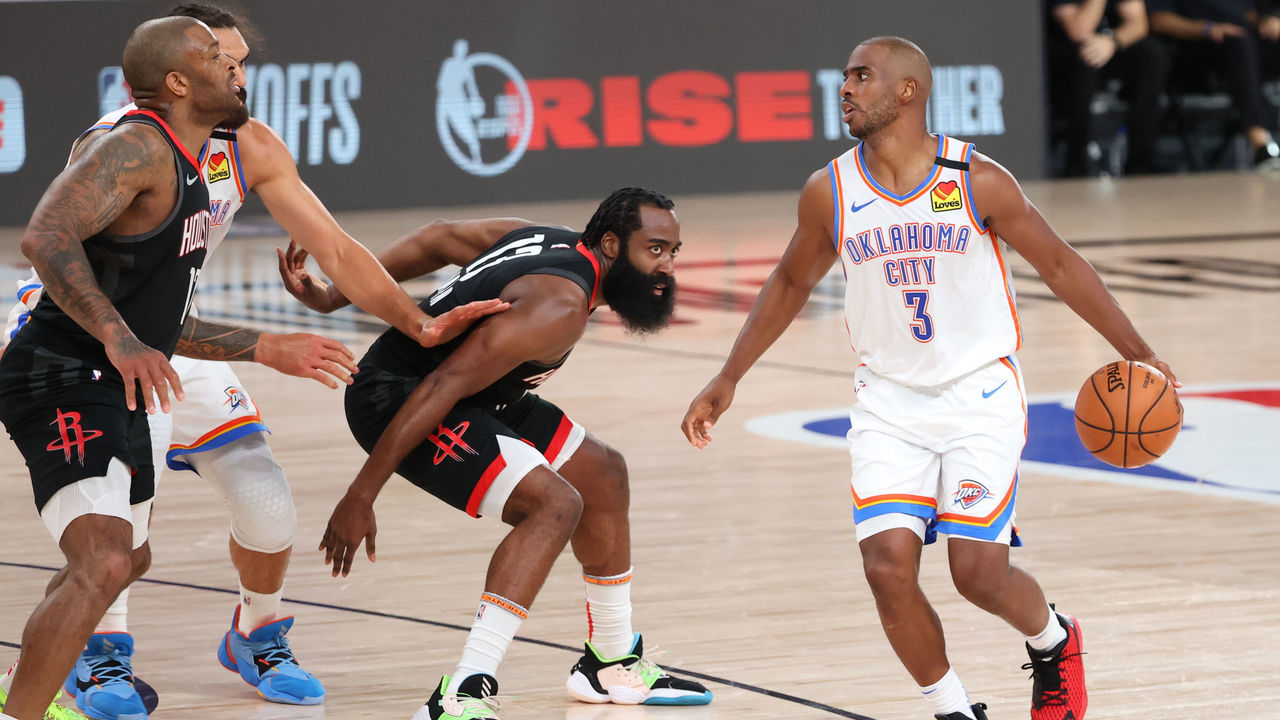This Thunder season was more fun than it had any right to be
All season long, the Oklahoma City Thunder were ruthless in the clutch. In what was meant to be a transition year at best, their preternatural ability to win close games propelled them to unforeseeable heights.
During the regular season, they were 30-15 with a league-best 24.4 net rating in games that were within five points in the final five minutes. Then they pushed their first-round playoff series against the Houston Rockets to a Game 7 by winning the first three games in the series that included clutch time.
They gave themselves another opportunity to flex their crunch-time muscle in Game 7, taking the Rockets down to the wire. Alas, their offense went ice-cold, managing just three points over the final four-and-a-half minutes. When the dust cleared from a chaotic finish - which included undrafted granite slab Luguentz Dort having his potential game-winner blocked by James Harden, a refereeing controversy, and, finally, the Thunder failing to get a shot off because of a broken inbounds play with 1.1 seconds left - they'd lost by two, and their season was over.
That OKC's season lasted as long as it did was maybe the most unexpected thing that happened on the court in the NBA in 2019-20. Consider how it began, with the Thunder shipping out franchise point guard Russell Westbrook (coming off his third straight year averaging a 20-point triple-double) and Paul George (who finished third in both MVP and Defensive Player of the Year voting last season). And consider that it ended with them finishing with their best winning percentage and most playoff victories of any season in the post-Kevin Durant era.

Those offseason trades brought back a truckload of draft picks and promising young player Shai Gilgeous-Alexander. That set the Thunder up for the future and suggested that a full-scale rebuild and a season in the tank was in the offing. Chris Paul, acquired from Houston in the Westbrook trade, was entering his age-35 season, and it felt safe to assume that the aging, notoriously persnickety point guard wouldn't be at all interested in sticking around. It seemed evident the Thunder would reroute him to a third team to complete their teardown.
They tried, but they couldn't find a willing trade partner, and suddenly it seemed like Paul had gotten trapped in a nightmare of his own making. Here was this ornery perfectionist set to spend his twilight years stranded on a small-market rebuilding outfit because no other team wanted to gamble on a 6-footer in his mid-30s with a lucrative contract, a checkered injury history, and a reputation for chafing teammates raw.
But Paul, whatever you may think of him, isn't a moper or a quitter. He quickly made peace with his circumstances and got down to the business of pulling together the mishmash of youngsters and vets that made up the refashioned roster. What was meant to be a Thunder rebuild instead became a reinvention.
"When he first got traded and we spoke for the first time, I told him, 'I don't know about all the rumors,'" Thunder coach Billy Donovan told Sports Illustrated's Rohan Nadkarni back in January. "And he said this: 'I only know how to do it one way, Both my feet are in the circle here, and you're going to get all I can give to this organization.' And he's totally lived up to that."
Paul can no longer smoke defenders off the bounce, and he barely even bothers trying to get to the rim anymore, but he continued to exert his brainy brand of string-pulling dominance. His 61% true shooting percentage this year was the second-best mark of his career, fueled by a personal best 55.4% mark from 2-point range. He ranked fifth in the league in Real Plus-Minus and sixth in Player Impact Plus-Minus. The Thunder were 13.4 points per 100 possessions better with him on the floor. He was arguably the NBA's best high-volume crunch-time player. And he enjoyed his healthiest season in years, missing just two games and cracking the 70-game threshold for the first time since 2015-16.
Paul didn't make the best of a bad situation so much as he helped turn a potentially bad situation into a great one for everybody involved.
His backcourt mate and mentee, Gilgeous-Alexander, blossomed in his second season into one of the league's bright young stars, nearly doubling his scoring average by fine-tuning the syncopated rhythms of his herky-jerky dribble-drive game, mastering angles around the basket, and turning his jumper into a more consistent weapon. Before P.J. Tucker hit a floater that put Houston up for good with 85 seconds left in Game 7, it was the 22-year-old Canadian who put the Thunder ahead with a massive 3-pointer from the corner, just as he did in Game 3.

Few players, if any, changed perceptions about themselves more this season than Dennis Schroder, whom the Hawks practically salary-dumped to OKC two years ago in the Carmelo Anthony deal. He was long derided (with some justification) as an empty-calorie gunner who thought a little too highly of his own shot-making ability, didn't score efficiently, and played little or less defense. This year, he produced by far his best shooting percentages inside (51.3%) and outside (38.5%) the arc, defended with newfound tenacity and purpose, improved tremendously as an at-rim finisher, and established himself as one of the league's most valuable reserves.
Against Houston, Schroder was the Thunder's most reliable switch-buster, exploding past Rockets defenders off the dribble and getting to the rim virtually at will. OKC's offense completely collapsed without him on the floor in the series. And while he didn't have his scoring touch in Game 7, he competed like a maniac, gamely guarding Harden for stretches and laying out for loose balls.
For the Thunder, stumbling onto the three-guard lineup of Paul, Gilgeous-Alexander, and Schroder was like accidentally discovering penicillin. Despite their collective lack of size and the fact that all three operate best with the ball in their hands, that trio formed the most effective three-man combination in the league, with a 28.6 net rating in 401 regular-season minutes and an 11.4 net rating across 108 playoff minutes.
Closing games with all three ball-handlers on the floor powered the team's staggering success in the clutch. All year long, they danced circles around shellshocked opponents, and what made it so much fun is that they all did it in different ways: Paul methodically probing in search of his patented elbow jumper, Schroder zooming to the rim with straight-line drives, Gilgeous-Alexander zig-zagging his way into wacky bank shots and wrong-foot floaters.
Danilo Gallinari, the other player who arrived from the Clippers in the George trade, had a characteristically efficient scoring season, putting up 61.2% true shooting and serving as the stretch-four the team has sorely needed for so long. The lineup featuring those three guards with Gallinari and Steven Adams posted the best net rating of any five-man group to play more than 100 minutes in the last two seasons.
And then there was Dort, the human Thwomp who signed a four-year, $5.4-million deal out of college, cracked the Thunder's rotation midway through the season, and became a mainstay thanks to his boundless energy, ridiculous strength, and outright refusal to get screened. Dort's defense stood out during the regular season, but the playoffs were his coming-out party, as he returned from a Game 1 absence and proceeded to alter the series with his coverage on Harden.

It's not an overstatement to say Dort did as good a job defending the three-time reigning scoring champ one-on-one as anyone in the last three or four years. Harden was so bothered by Dort's constant, pestering presence inside his jersey that he started calling for an endless parade of ball screens after having all but ditched them for straight isolations following the Clint Capela trade. Very few of those screens managed to dislodge the 6-foot-3, 220-pound fire hydrant.
For all his defensive brilliance, Dort had largely been an offensive liability in the series before Game 7. The Rockets completely ignored him and forced the Thunder to either play four-on-five or feed the shaky-shooting rookie a steady diet of threes. In Game 5, he led the team in shot attempts, shooting 3-of-16 from the field and 0-of-9 from deep.
Then, in Game 7, the shots started to fall. He wound up hitting six 3-pointers, and with Rockets defenders suddenly closing out on him, he had a chance to showcase a few multi-dribble power-crossover moves that got him to the rim and to the free-throw line. He once again led the team in field-goal attempts, but this time he made them count, finishing with a game-high 30 points. He held Harden to just 17.
It was almost enough. When the Rockets, leading by two, jammed up the middle of the floor to prevent Paul from getting to the elbow on the last possession, the ball eventually got swung to Dort on the left wing. At Paul's urging, Dort had been shooting without hesitation all game, so when it found him, he immediately rose up for the would-be game-winner. It would've been the perfect climax to the Thunder's storybook season - eliminating the team whose star player was so opposed to playing another year with Paul that he reportedly gave the front office a him-or-me ultimatum last summer. But Harden got the last laugh.
"We fought hard all year," an emotional Paul told reporters after the game. "Obviously a lot of people doubted us, but we didn't doubt ourselves. We didn't give a damn about anybody's predictions going into any series. And any game we expected to win. That's the way we played all season long: Every game, we expected to win."

The big question now is whether we'll see this group back together again. Gallinari is set to become an unrestricted free agent. Paul will likely be easier to move this summer now that he's got one less year on his deal and is coming off a healthy, redemptive season. Schroder and Adams are going into the last years of their contracts. Given all that, and the fact that the Thunder, as currently constructed, don't figure to be among next season's true contenders, their ever-aggressive and forward-thinking front office may well still decide to blow this thing up.
That was always sort of the plan, and tanking in a year in which every other West team looks primed to compete for a playoff spot would be a good way to add to OKC's young talent base and stockpile of draft assets. For now, outside of Gilgeous-Alexander, Dort, and 2019 first-round pick Darius Bazley (who had a nice series), there isn't a ton to build around. Maybe the team will try to extend Schroder, who's just 26 years old.
Whatever happens, this expectation-defying campaign - which came so close to culminating in the most satisfying possible outcome, and which may have, among other things, been the last great Chris Paul season we get to witness - will be remembered fondly for a long time.
This isn't about moral victories; it's just about appreciating something for what it was. This Thunder season was delightfully improbable, improbably delightful, and more fun than it had any right to be. Let's appreciate it for that.
Joe Wolfond is a features writer for theScore.